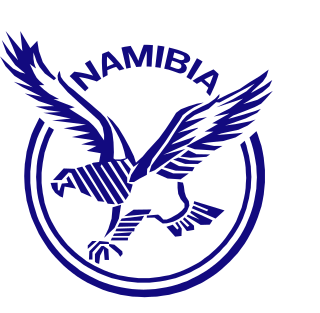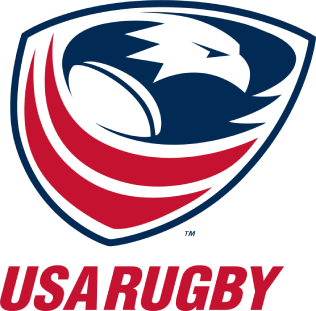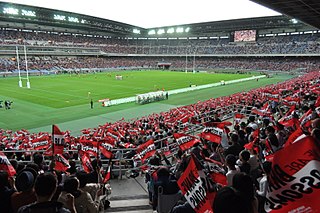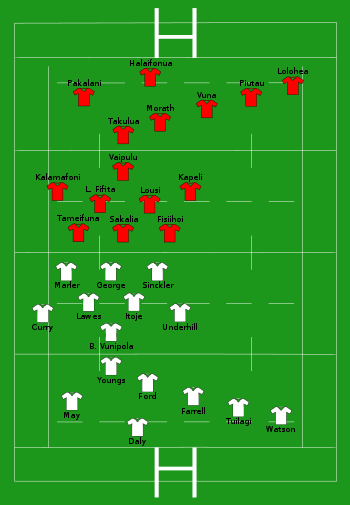
The Namibia national rugby union team represents Namibia in men's international rugby union competitions nicknamed the Welwitschias, are a tier-two nation in the World Rugby tier system, and have participated in seven Rugby World Cup competitions since their first appearance in 1999. They are governed by the Namibia Rugby Union.

The Italy national rugby union team represents the Italian Rugby Federation in men's international rugby union. The team is known as gli Azzurri. Savoy blue is the common colour of the national teams representing Italy, as it is the traditional colour of the royal House of Savoy which reigned over the Kingdom of Italy from 1860 to 1946.

The United States men's national rugby union team, nicknamed the Eagles, represents the United States of America Rugby Football Union in men's international rugby union. USA Rugby is the national governing body for the sport of rugby union in the United States, and is a member of Rugby Americas North, one of six regional governing bodies under World Rugby. Until rugby returned to Olympic competition, with sevens at the 2016 Rio Games, the United States was the reigning Olympic rugby champion, having won gold at the 1920 and 1924 Summer Olympics.
Rugby World Cup records have been accumulating since the first Rugby World Cup tournament was held in 1987.

The England national team have competed in every Rugby World Cup since the inaugural tournament in 1987. They have played 57 matches in ten tournaments, and won 42 for a winning record of 73.68%. Their best ever position was champions in 2003, whilst they have also participated in three other finals; the 2019 final, the 2007 final and the final of the 1991 competition. They have beaten one country five times, Argentina and three countries four times; Australia, United States and Samoa. Their worst record is against South Africa, who have defeated them in five of their six encounters.

The 2019 Rugby World Cup was the ninth edition of the Rugby World Cup, the quadrennial world championship for men's rugby union teams. It was hosted in Japan from 20 September to 2 November in 12 venues all across the country. The opening match was played at Ajinomoto Stadium in Chōfu, Tokyo, with the final match being held at International Stadium Yokohama in Yokohama. This was the first time that the tournament had taken place in Asia and outside the traditional Tier 1 rugby nations.

Namibia has competed in seven Rugby World Cup tournaments, having qualified as the African representative. The Namibian rugby union team, nicknamed the Welwitschias after the Namibian national symbol, made their first appearance at the Rugby World Cup in 1999 and appeared at the following six tournaments. Namibia has so far played 26 games at that cup without ever winning one.

The Ireland national rugby union team have played in all ten Rugby World Cup tournaments. They have reached the quarter-finals at all but two tournaments, but have yet to progress to the semi-finals. They have finished top of their pool on three occasions.
Italy have competed in all the Rugby World Cup tournaments, having made their first appearance in the inaugural 1987 tournament. They have finished third in their pool at every tournament, except in 1999, the only tournament where they lost more than two games. Having never finished in the top two in their pool, they have never qualified to progress to the quarter-finals. They have won the most matches of those that have never made it to the quarter-finals.
Pool C of the 2015 Rugby World Cup began on 19 September and was completed on 11 October 2015. The pool was composed of New Zealand, Argentina and Tonga – who all qualified automatically for the tournament due to finishing in the top three positions in their pools in 2011 – along with the top European qualifier, Georgia, and the top African qualifier, Namibia.
This article documents the statistics of the 2015 Rugby World Cup which took place in England from 18 September to 31 October.

The 2019 Rugby World Cup final was a rugby union match played on 2 November 2019 at the International Stadium Yokohama in Yokohama, Japan. It marked the culmination of the 2019 Rugby World Cup and was played between England and South Africa, a rematch of the 2007 Rugby World Cup final.

Joe Cokanasiga is a professional rugby union player for the England national rugby union team. He plays wing for Bath, having previously represented London Irish. He helped his former team win promotion from the RFU Championship in 2016–17 season to the English Premiership for the 2017–18 season.
Pool A of the 2019 Rugby World Cup began on 20 September 2019. The pool included hosts Japan, and previous 2015 Rugby World Cup quarter-finalists Ireland and Scotland. They were joined by the European qualifier, Russia, and Samoa, the winner of the European-Oceania Cross-Regional play-off.
Pool B of the 2019 Rugby World Cup began on 21 September 2019. The pool included title holders New Zealand and third-placed team from 2015 South Africa, while Italy also joined the pool after finishing third in their pool in 2015. They were joined by the African qualifier, Namibia, and the repechage winner, Canada.
The knockout stage of the 2019 Rugby World Cup began on 19 October and concluded on 2 November with the final at the International Stadium Yokohama in Yokohama, Japan.
The 2018 end of year rugby union tests, also referred to as the Autumn internationals in the Northern Hemisphere, were a number of rugby union test matches played during October and November, primarily involving countries from the Northern Hemisphere hosting those from the Southern Hemisphere. Also involved in matches are those from second-tier teams. These international games count towards World Rugby's ranking system, with a team typically playing from two to four matches during this period.
The 2020 Six Nations Championship was the 21st Six Nations Championship, the annual rugby union competition contested by the national teams of England, France, Ireland, Italy, Scotland, and Wales, and the 126th edition of the competition. The tournament began on 1 February 2020, and was scheduled to conclude on 14 March; however, due to the COVID-19 pandemic, Italy's penultimate match against Ireland and all three of the final weekend's matches were postponed with the intention of being rescheduled. It was the first time any match had been postponed since 2012, and the first time more than one match had been delayed since the outbreak of foot-and-mouth disease in 2001. In July 2020, a revised fixture schedule was announced, with the last four games being played in October.
This article documents the statistics of the 2019 Rugby World Cup which was held in Japan from 20 September to 2 November.
Pool B of the 2023 Rugby World Cup began on 9 September 2023 and concluded on 8 October 2023. The pool included holders and world-number-two ranked side South Africa, fellow automatic qualifiers and world-number-one-ranked side Ireland, and world-number-five-ranked side Scotland. They are joined by Romania and Tonga. It was widely referred to as the "group of death." Ireland topped the group and South Africa placed second, thus allowing both teams to progress.
















